Faculty Express Array of Concerns at ACCJC Open Forum
By JohnTaylor Wildfeuer
On Oct. 3 members of the peer review team sent by the Accrediting Commission for Community and Junior Colleges (ACCJC) held a forum for members of the City College community. Audio and video recordings were prohibited, and the review team was not permitted to respond to questions or comments.
Seats in multi-use building (MUB) room 140 steadily filled as the review team took their seats. After Dr. Erika Endrijonas introduced herself and her colleagues and affirmed that there would be no recording of the event, faculty member Rick Baum objected from the back of the room.
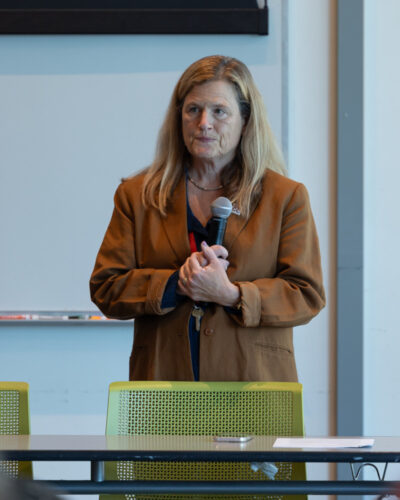
Photo by Don Collier/The Guardsman.
“Why can’t we record,” Baum said, to which Endrijonas replied it was an ACCJC policy designed to ensure that participants feel comfortable coming forward to speak.
“This is a feedback session,” said Endrijonas adding, “we will not be answering questions.”
The review team is composed of faculty and administrators from peer institutions. Of the ten team members, five were present at the forum: Dr. Norman Lorenz, professor of Education Studies at Sacramento City College; Dr. Jesse Mills, professor of political science at Compton College; Daniel Troy, Assistant Superintendent/Vice President of Administrative Services for the San Luis Obispo County Community College District; Dr. Mike Munoz, Superintendent/President for the Long Beach Community College District; and Dr. Erika Endrijonas, Superintendent/President of Pasadena City College and chair of the peer review team.
First at the microphone was Susan Boeckman, who has been a video editor and videographer for City College for over twenty years, and has acted as lead for the recording of the Board of Trustees’ (BoT) monthly meetings.
On the current trustees, Boeckman said, “This group needs some help, their hearts are in the right place, but many are young and inexperienced.” This sentiment, requesting guidance for the BoT by the ACCJC, would be echoed by several other speakers before the forum ended an hour later.
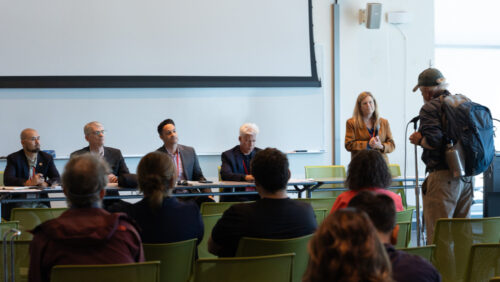
Photo by Don Collier/The Guardsman.
Rick Baum, a professor of political science at City College and next to speak, referred back to Boeckman’s statement and said, “Immature and young, that’s astounding to me.”
His voice took on an emotional strain as he recounted the experience of the ACCJC’s actions beginning in 2012, when court action was needed to reverse the accrediting body’s decision to strip the college of its accreditation in 2014. “Who was victimized by the ACCJC in the past?” Baum asked, before answering, “Students and teachers, not administrators.”
To the representatives present, Baum said, “I wonder if you have credibility in the eyes of anyone.”
Curriculum Chair Dr. Craig Kleinman was next to come forward and described the accreditation process as “brutal and extreme,” adding that in 2013, “We needed more guidance but [the ACCJC] went right to Show Cause.”
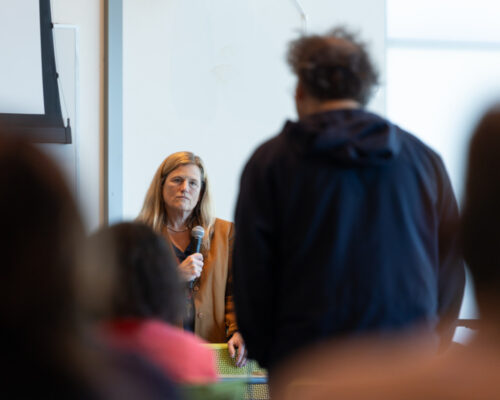
Photo by Don Collier/The Guardsman.
Kleinman suggested an intervention to bring conflicting factions of the college together, to create a “kinder institution, work together.”
He acknowledged that the “current ACCJC is not the past ACCJC,” and noted to the review team, “There are tensions, whatever help you can give us, we want to transcend the dissonance.”
While almost all speakers said they observed contentiousness between the chancellor, the Board of Trustees, faculty, students, and community members, responsibility for this “tension” stemmed from different sources according to different speakers.
Michael Snider, current president of the college’s Classified Senate, described the Board of Trustees as “not very cohesive” and said, “There is a lot of in-fighting in front of us.”
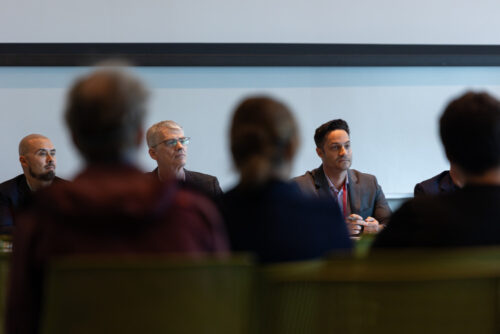
Photo by Don Collier/The Guardsman.
Snider, expressing concern over the reputational effects of such friction, said, “I don’t know who is going to want to come to this campus.”
Political science professor Louis Schubert, who serves on the college’s Academic Senate, offered historical perspective, statistical analysis, and personal observations.
In the past, Schubert said, “The Board of Trustees was primarily older retired persons giving back … the college was thriving.”
Now, he said, the board is often made up of “wannabees” with “conflicting agendas” who are often most concerned with that which will “affect them politically.”
Schubert also noted that “one problem with our board is that they don’t seem to like following rules, even their own rules.”
For example, before seeking new hires, Schubert said, “The board has a responsibility to give competitive pay to employees it already has.” According to Schubert’s figures, a 40% increase in pay like that which the United Auto Workers are currently fighting for, would only bring City College faculty pay up to the median of Bay Area salaries.
Schubert described the college’s recent chancellor search as the “most pathetic turkey trot I’ve ever seen.” He believes chancellors like David Martin are “really good, but we are not retaining them.”
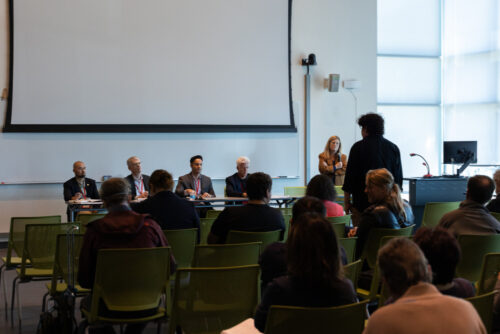
Photo by Don Collier/The Guardsman.
Abigail Bornstein, a professor in the Computer & Information Technology department and frequent attendee and public commenter at Board of Trustees meetings, said she is “extremely uncomfortable with the direction the school is headed.”
Describing a recent board meeting as an “orchestrated circus,” Bornstein said, “I can’t think of a self-respecting chancellor that would walk into this campus,” pointing to ways in which she believes the Board of Trustees has tied the chancellor’s hands.
After she spoke at that board meeting, Bornstein said she was “booed, and people see that.” Furthermore, she said, Board President Wong, who has been increasingly quoted by the press of late, has been saying things that are “so inappropriate, so egregious.”
Rick Baum, returning to the microphone, added to his previous statement a litany of frustrations including layoffs by recent chancellors, unfair labor practices, and the as-yet unresolved facilities issues relating to heating and cooling classrooms.
Horticulture professor and member of the curriculum committee Malcolm Hillan, reading from a prepared statement, said the college has faced “an array of problems, some solved, some survived” and expressed his belief that contributing factors include “revolving door” positions, and a Board of Trustees “driving [the chancellor] from the back seat” with desires for “political ascendancy.”
A rare voice of optimism at the forum, Karl Westerberg, a professor of physics, said he has “generally been pleased” with Chancellor Martin who he said is “very committed to enrollment growth” and regularly checks with legal counsel during BoT meetings.
Westerberg said he has “a lot more confidence in the college’s future.”
Claire Heimer, a mathematics department professor, noted “competing visions” among college stakeholders, as well as “long waitlists” for classes. Despite issues at the college, Heimer, in a rare moment of levity for the forum, said, “I have self-respect, but I would absolutely be chancellor of this school. I don’t think that’s necessarily a good idea, but it wouldn’t be a lack of self-respect.”
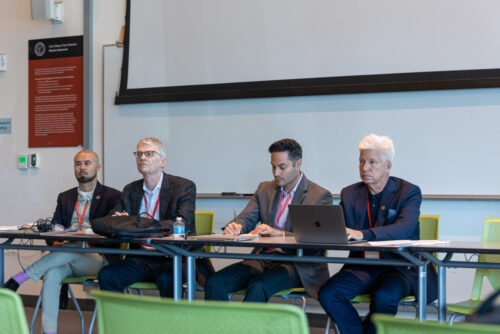
Photo by Don Collier/The Guardsman.
Last to speak at the event was Fanny Law, an ESL professor and First Vice President of the Academic Senate. After expressing “concerns about the working environment … salaries and compensation,” Law described how the ESL department took matters into its own hands when it found that there were “no students in our classes” at the start of the COVID-19 pandemic.
Professors in the department called individual students and helped them register for courses, walking them through the complexities of distance learning, barriers-to-entry they may not have otherwise overcome.
Earlier, professor Schubert had described the situation, past and present, as “demoralizing,” and added, “All of that, plus we were underpaid for it.”
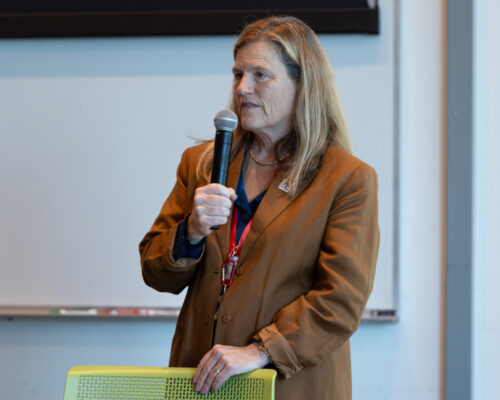
Photo by Don Collier/The Guardsman.
Endrijonas closed the forum and thanked “everyone who came.”
The ACCJC peer review team finished conducting its onsite visit Oct. 4, after addressing its “Core Inquiries” from April 2023, which outlines further information sought by the commission following an Institutional Self-Evaluation Report (ISER) conducted by the college in December of 2022.
